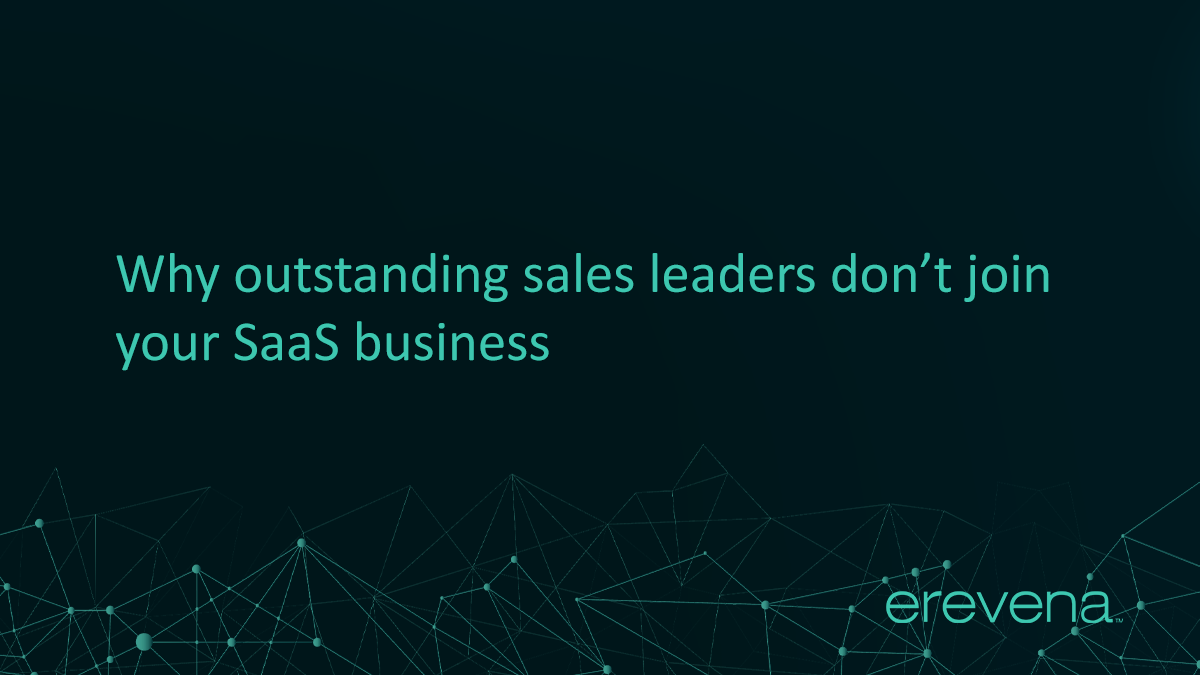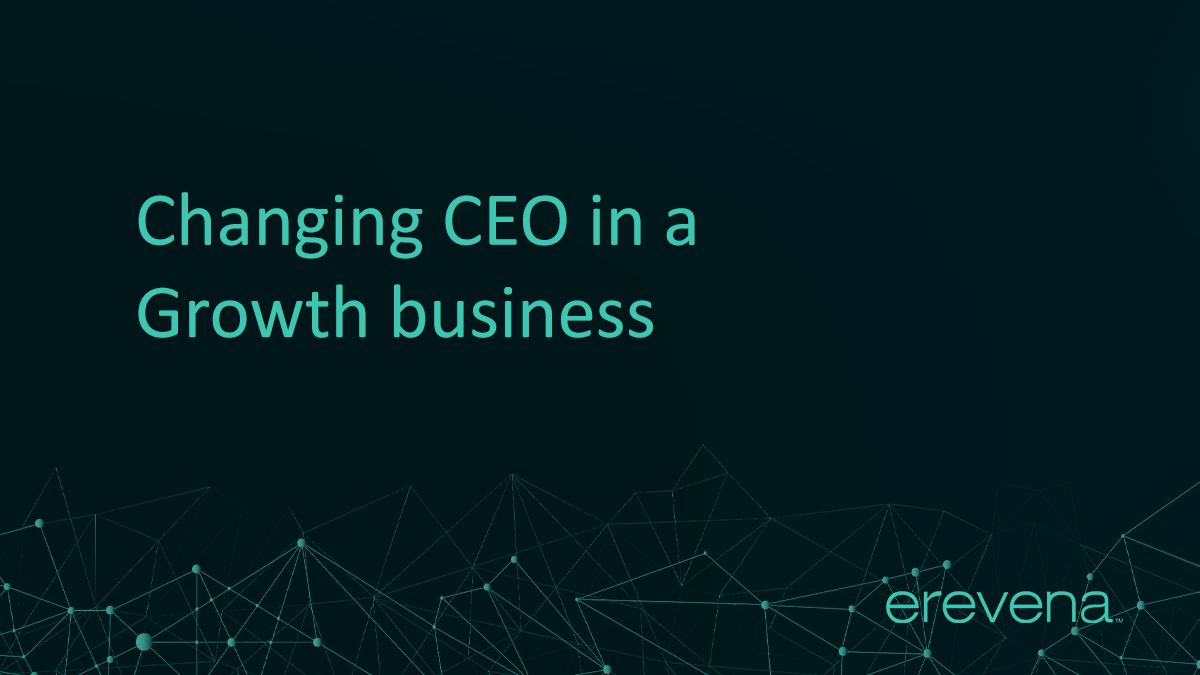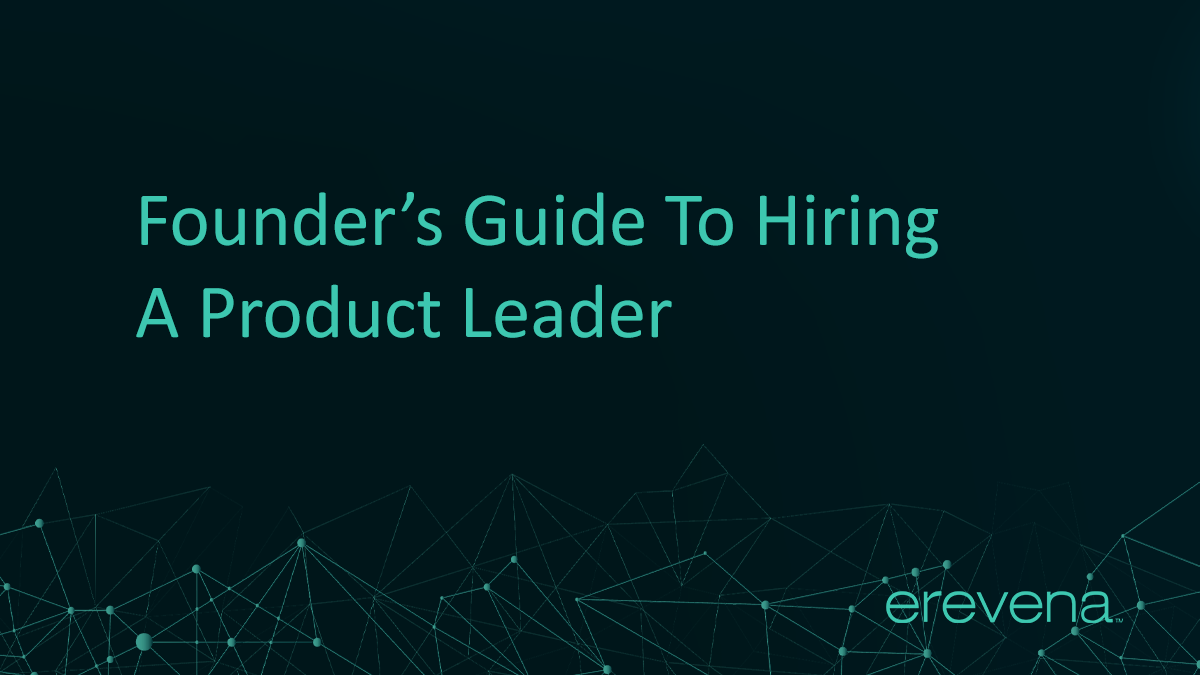Joe Abbott works with early-stage SaaS clients and has learnt a few lessons over the years about what it takes to successfully hire the best sales leader into your business. He shares some of the most common reasons your perfect sales hire might say no.
At Erevena we have helped hundreds of companies to hire senior sales leaders over the last decade. Whilst we partner with companies at various stages of their maturity journeys and work across several asset classes, one of our ‘sweet spots’ is helping young, funded and often founder-run start/scale-ups to hire senior commercial execs (for the first time, in many cases). I personally work with a lot of our early-stage SaaS clients in this capacity and have learnt a few lessons over the years about what it takes to successfully hire the best sales leader into your business. Perhaps a better way to position these learnings is, what NOT to do when you are looking to close your next CRO/VP Sales. Below are some of the most common reasons your perfect hire might say no:
You don’t sell
Believe it or not, salespeople want to be sold to.
A common mistake that young companies make, is expecting the early stages of the interview process to be just that – an interview. All senior execs, but especially those in sales leadership, expect a two-way conversation in the early stages of a hiring process. Of course, they will come prepared to sell their skills and experiences but will also expect to be sold hard on the opportunity you’re offering. Founders with the most effective recruitment strategies tend to spend more time in the first conversation selling their company than asking interview questions. These candidates get called multiple times every week about exciting new opportunities in the market and (assuming you are working with a competent search partner) you should have some assurance already that their skills could be a good potential fit for your business. Therefore, our strong advice is to treat that first session as an opportunity to ‘hook’ their interest and get them fired up to commit to the rest of the interview process, where you will have ample time to gather all of the data you need.
It is a big turn-off for senior sales leaders when the first session is focused on them and why they are so well-equipped for this role. In reality, they probably don’t know yet how much they even want the role. Getting that balance right in the first session is absolutely key.
The hiring process is too slow or poorly defined
The best sales leaders, by nature, are rigorous in style. When closing a deal, they build a clearly defined sales process and then drive that process to completion as quickly and efficiently as possible. They look to hire and work with people who have the same mentality. They are also trained to hyper-evaluate every stage of any sales process and identify any potential red flags (and we should not forget that, to them, a recruitment cycle is another form of a sales process). John McMahon, a notorious figure in the world of software sales and one of the authors of the widely used MEDDIC/MEDDPICC methodology, once said that the key to be a successful salesman is relentless qualification of everything and everybody. The very best of these people are quick to qualify themselves out of deals where they fear they could be wasting their time. Cliché as it might be, ‘time is money’ and if they feel that theirs could be better spent elsewhere, that is where they will go.
If your hiring process drags or if there is a lack of clarity around the stages that the candidate needs to get through to reach an offer, the likelihood of the best people qualifying themselves out increases massively. If the various stakeholders are working from different ‘scorecards,’ that will become evident and frustrate the candidate also, often leading to the same result.
Poor approach to interview feedback
Again, it is important to remember that the top 10% of sales leaders will use the same mentality with which they qualify a prospective deal to qualify their own chances in your exec hiring process. Therefore, something that should never be underestimated is the importance of fast and high-quality feedback after they have completed interviews. Speed is important, because it reinforces that you are serious about their candidacy and want to get to the right result efficiently. But good quality feedback is also critical. A simple ‘move forwards’ message will not satisfy the best commercial execs. They want to know specifically what you like and what you want to dig deeper into during the next stages, as this drives their preparation (and the very best prepare extensively for interviews).
Slow feedback gives the impression that they or the process is not a priority for you. Poor quality feedback limits their ability to do the meticulous prep that makes them so effective. Both run the risk of losing you top candidates.
Holes in your data
We know from many years of experience working with young, fast-growth SaaS companies, that the financials are rarely perfect. Driving double-to-triple digit ARR growth year after year is a big ask; cash burn is often higher than it would ideally be; sales reps don’t always hit their numbers, etc. The truth is, just like any other exec joining you at an early stage in your evolution, sales leaders with experience at your maturity-level will not expect the answers to their financial questions to blow them away. But what they will expect are accurate and consistent answers. To accurately qualify the opportunity, you must make sure that you give them all the data to work with (and that the numbers you give them are consistent with the answers your co-founders, leadership team and investors are giving too). If they feel that they are not getting the full picture or there are big discrepancies in the data they are getting, this will raise a major red flag.
The package is not exciting enough
It sounds obvious, but it is still one of the most common reasons that growth businesses fail to close their preferred sales leader. Let’s not beat around the bush, VP Sales/CROs are expensive. Hiring the best people will likely mean parting with £350k-£500k (pre-equity) a year, depending on seniority and scale. This can feel like a hugely intimidating figure, especially when you also have to give away a meaningful chunk of stock. But the trap that many founders and CEOs of early-stage companies fall into is using their own judgement to determine what a ‘fair’ salary for their sales leader is or comparing their packages to other execs in the business.
This can cause a disconnect because the candidate will be using different data sets to determine what they feel they are worth, especially what their peers in similar roles are being paid and what other companies are offering. Your sales leader will always cost more than most other execs on your leadership team, but that is because they will have the largest influence on your revenue growth.
We often find ourselves in the middle of a negotiation between a sales leader and a prospective employer where the two sides have a different view of what is ‘fair.’ Put simply, a lot of the VP Sales/CRO earnings (usually 50%) are performance driven. If that person can help add millions to your ARR number, the extra £20-50k they might be asking for will feel like a pretty insignificant amount in the long-run. This does not mean you should pay whatever somebody demands, but it does mean that you should take a sensible approach to this topic if you feel that you have found the perfect match. Ultimately, if they aren’t performing, they will not last long enough to earn the money anyway, so it is important to take a view on their salary demands in that context.
As much as they might love your product, culture and market opportunity, if they are not convinced the earnings are exciting enough, they won’t join. And squabbling over cash can raise broader concerns for candidates too, such as will I have to go through this battle every time I want to hire a brilliant sales rep?
Conclusion
In summary, our advice on maximising your chances of hiring the best possible VP Sales/CRO for your SaaS business is:
- Sell – especially in the early stages of a search process. The best advice we can give is to approach the first meeting with the sole aim of getting the candidate excited enough to come back for a second meeting.
- Before you even meet your first candidate, build a slick and clearly defined interview process and communicate that to all key stakeholders. Build a scorecard that everybody signs-off to make sure you are all evaluating candidates on the same criteria set. Prioritise driving the process and avoid unnecessary delays.
- Give prompt and high-quality feedback. Candidates will then know you are serious and that the search is a priority for you. They will also feel well-positioned to prepare accordingly for the next sessions.
- Give honest and consistent answers around key data, especially the finances. Inconsistencies or ambiguity will be a big warning sign for sales leaders.
- If you have found the perfect person, avoid squabbling over package. Taking advice on the salary ranges from your search partner and board should give you a level of comfort, but it is also well worth remembering that they have to perform to earn it. And, if they do perform, you will end up on the better end of the deal.
Share this article:












